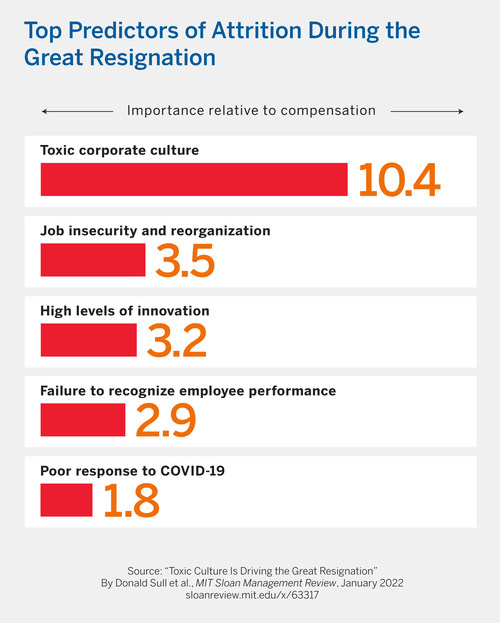A toxic workplace culture – not wages as most commonly believed – is driving the Great Resignation, according to new research released by MIT Sloan Management Review (MIT SMR).
The study has revealed that toxic corporate culture is the top predictor for employee attrition in the Great Resignation. This holds true across both blue-collar and white-collar industries for the period between April and September 2021. To better understand the causes of the Great Resignation and help leaders respond effectively, the authors of the report analysed data from Revelio Labs, by looking at 34 million online employee profiles to identify US workers who left their employer. They then analysed the employer’s culture using data from the MIT SMR/Glassdoor Culture 500 dataset of hundreds of the largest employers in the United States.
“Much of the media coverage surrounding the Great Resignation focuses on high turnover among burned-out knowledge workers who are dissatisfied with their stagnant wages,” commented lead author Donald Sull, senior lecturer at the MIT Sloan School of Management and Co-founder of CultureX; a company that uses AI to measure and improve corporate culture. “However, a toxic corporate culture is by far the strongest predictor of industry-adjusted attrition and is 10 times more important than compensation in predicting turnover.”

STEPS TO BOOST RETENTION
The research also identified four steps that can boost retention in the short term across both blue-collar and white-collar industries. They include lateral career opportunities, remote work, social events and more predictable schedules. These steps offer effective, inexpensive ways to increase retention, confirmed the authors. The research also suggests that offering company-sponsored social events has a 1.3 times as powerful effect on boosting retention as a rise in compensation. Additionally, lateral career opportunities was 2.5 times as powerful as an increase in compensation.
“Leaders who are serious about winning the war for talent during the Great Resignation and beyond must do more. They should understand and address the elements of their culture that are causing employees to disengage and leave. And above all else, they must address anything that makes their culture toxic,” added Charles Sull, Co-author of the article and Co-founder of CultureX.
You can read the full article Toxic Culture Is Driving the Great Resignation, from the MIT Sloan Management Review here.







































